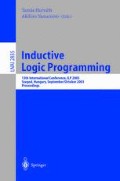Abstract
It is well known that many hard tasks considered in machine learning and data mining can be solved in an rather simple and robust way with an instance- and distance-based approach. In this paper we present another difficult task: learning, from large numbers of performances by concert pianists, to play music expressively. We model the problem as a multi-level decomposition and prediction task. Motivated by structural characteristics of such a task, we propose a new relational distance measure that is a rather straightforward combination of two existing measures. Empirical evaluation shows that our approach is in general viable and our algorithm, named DISTALL, is indeed able to produce musically interesting results. The experiments also provide evidence of the success of ILP in a complex domain such as music performance: it is shown that our instance-based learner operating on structured, relational data outperforms a propositional k-NN algorithm.
Access this chapter
Tax calculation will be finalised at checkout
Purchases are for personal use only
Preview
Unable to display preview. Download preview PDF.
References
Bisson, G.: Learning in FOL with a Similarity Measure. In: Proceedings of the 10th AAAI (1992)
De Raedt, L.: Interactive Theory Revision: an Inductive Logic Programming Approach. Academic Press, London (1992)
Duda, R., Hart, P.: Pattern Classification and Scene Analysis. John Wiley & Sons, New York (1967)
Dzeroski, S., Schulze-Kremer, S., Heidtke, K.R., Siems, K., Wettschereck, D., Blockeel, H.: Diterpene structure elucidation from 13C NMR spectra with inductive logic programming. Applied Artificial Intelligence: Special Issue on First-Order Knowledge Discovery in Databases 12(5), 363–384 (1998)
Emde, D., Wettschereck, D.: Relational Instance-Base Learning. In: Proceedings of the Thirteen International Conference on Machine Learning (ICML 1996), pp. 122–130. Morgan Kaufmann, San Mateo (1996)
Helft, N.: Induction as nonmonotonic inference. In: Proceedings of the 1st international Conference on Principles of Knowledge Representation and Reasoning, pp. 149–156. Morgan Kaufmann, San Francisco (1989)
Mehlhorn, K.: Graph algorithms and NP-completeness. Data structures and algorithms, vol. 2. Springer, Heidelberg (1984)
Muggleton, S.H., Feng, C.: Efficient Induction of Logic Programs. In: Proceedings of the First Conference on Algorithmic Learning Theory, Tokyo (1990)
Muggleton, S., de Raedt, L.: Inductive Logic Programming: Theory and Methods. Journal of Logic Programming 19,20, 629–679 (1994)
Ramon, J., Bruynooghe, M.: A Frameworkfor defining distances between first-order logic objects. In: Page, D.L. (ed.) ILP 1998. LNCS, vol. 1446, pp. 271–280. Springer, Heidelberg (1998)
Ramon, J., Bruynooghe, M.: A polynomial time computable metric between point sets. Report CW 301, Department of Computer Science, K.U.Leuven, Leuven, Belgium (2000)
Rouveirol, C.: Extensions of inversion of resolution applied to theory completion. In: Muggleton, S. (ed.) Inductive Logic Programming, Academic Press, London (1992)
Sebag, M., Rouveirol, C.: Tractable induction and classification in FOL Via Stochastic Matching. In: Proceedings of IJCAI-1997, Morgan Kaufmann, San Francisco (1997)
Todd, N.M.A.: The Dynamics of Dynamics: A Model of Musical Expression. Journal of the Acoustical Society of America 91, 3540–3550 (1992)
Tobudic, A., Widmer, G.: Playing Mozart Phrase By Phrase. In: Ashley, K.D., Bridge, D.G. (eds.) ICCBR 2003. LNCS, vol. 2689, Springer, Heidelberg (2003)
Widmer, G.: Machine Discoveries: A Few Simple, Robust Local Expression Principles. Journal of New Musical Research 31(1), 37–50 (2002)
Widmer, G.: Discovering Simple Rules in Complex Data: A Meta-learning Algorithm and Some Surprising Musical Discoveries. Artificial Intelligence 146(2), 129–148 (2003)
Widmer, G., Dixon, S., Goebl, W., Pampalk, E., Tobudic, A.: In: Search of the Horowitz Factor. AI Magazine (2003) (in press)
Widmer, G., Tobudic, A.: Playing Mozart by Analogy. Journal of New Musical Research (2003) (in press)
Author information
Authors and Affiliations
Editor information
Editors and Affiliations
Rights and permissions
Copyright information
© 2003 Springer-Verlag Berlin Heidelberg
About this paper
Cite this paper
Tobudic, A., Widmer, G. (2003). Relational IBL in Music with a New Structural Similarity Measure. In: Horváth, T., Yamamoto, A. (eds) Inductive Logic Programming. ILP 2003. Lecture Notes in Computer Science(), vol 2835. Springer, Berlin, Heidelberg. https://doi.org/10.1007/978-3-540-39917-9_24
Download citation
DOI: https://doi.org/10.1007/978-3-540-39917-9_24
Publisher Name: Springer, Berlin, Heidelberg
Print ISBN: 978-3-540-20144-1
Online ISBN: 978-3-540-39917-9
eBook Packages: Springer Book Archive

